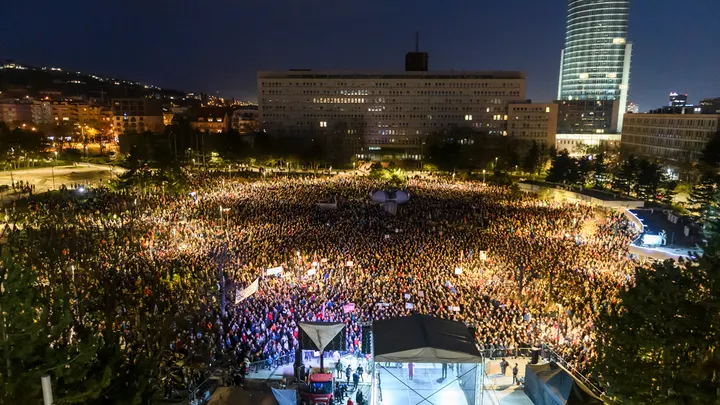In the heart of Slovakia’s capital, thousands rallied in a powerful display of dissent against the newly proposed changes to the country’s public broadcasting system. Spearheaded by populist Prime Minister Robert Fico’s government, this overhaul has sparked anti-government protests, drawing in a broad spectrum of society, including President Zuzana Čaputová, local journalists, opposition politicians, and international organizations. The central concern is the fear that these reforms could transform the Slovak public television and radio into a mouthpiece for government propaganda, undermining the democratic fabric of the nation.
The protesters, congregating in Freedom Square in downtown Bratislava, expressed their staunch opposition to a plan that, according to critics, threatens to place the Slovak public broadcaster under complete governmental control. “We must not allow that to happen,” declared Zora Jaurova, a lawmaker from the opposition Progressive Slovakia party, emphasizing the risk of turning the broadcaster into “a trumpet for government propaganda.”
Under the draft plan by Culture Minister Martina Simkovicova, RTVS would be replaced by a new entity directed by a seven-member council nominated by the government and parliament. This move has raised eyebrows among proponents of free speech and democracy. Noel Curran, the European Broadcasting Union (EBU) director general, labeled the proposal “a thinly veiled attempt to turn the Slovak public service broadcaster into state-controlled media,” highlighting the dire implications for democracy and freedom of expression.
This proposed overhaul is considered part of Fico’s administration’s broader attack on free media, an action met with widespread condemnation from the Slovak journalistic community and beyond. Critics argue that these changes are unnecessary and accuse the government of attempting to censor alternative viewpoints, an allegation denied by about a thousand journalists and broadcaster staff.
Simkovicova’s ties to the ultra-nationalist Slovak National Party and her previous work for a disinformation-spreading internet television add another layer of controversy to the debate. Meanwhile, Fico’s government faces opposition on various fronts, including its pro-Russian stance and legal reforms perceived as soft on corruption, prompting thousands to protest against his policies across Slovakia.
The ongoing protests in Slovakia represent a critical juncture for the country, as citizens from diverse walks of life unite to defend media independence and democratic principles. The widespread opposition to Prime Minister Fico’s proposed broadcasting overhaul underscores a collective apprehension about the future direction of Slovakia, with many fearing a drift towards the illiberal paths taken by neighboring countries. As the situation unfolds, the world watches closely, hoping that the voice of the Slovak people will guide the nation toward maintaining its democratic integrity and media freedom.







